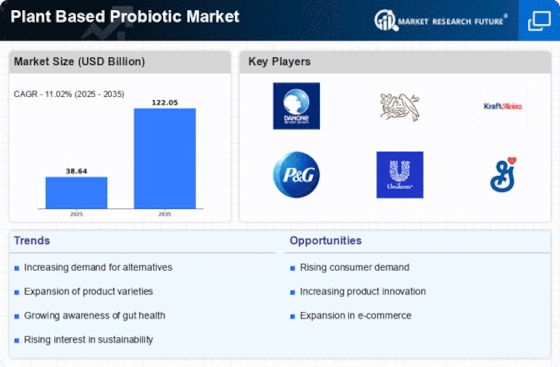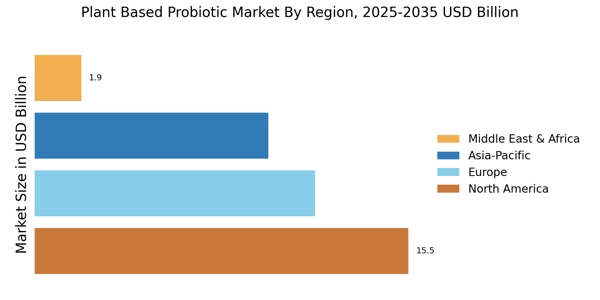Health Conscious Consumer Trends
The increasing awareness of health and wellness among consumers appears to be a primary driver for the Plant Based Probiotic Market. As individuals become more informed about the benefits of gut health, there is a noticeable shift towards plant-based dietary options. Research indicates that probiotics derived from plant sources can enhance digestive health and boost immunity, which resonates with health-conscious consumers. In 2025, the market for plant-based probiotics is projected to grow significantly, driven by the demand for natural and organic products. This trend suggests that consumers are actively seeking alternatives to traditional dairy-based probiotics, thereby expanding the market for plant-based options.
Rise of Veganism and Vegetarianism
The growing popularity of veganism and vegetarianism is likely to propel the Plant Based Probiotic Market forward. As more individuals adopt plant-based diets for ethical, environmental, or health reasons, the demand for plant-based probiotics is expected to increase. Data indicates that the number of people identifying as vegan has risen dramatically in recent years, leading to a corresponding rise in the consumption of plant-based products. This shift not only reflects changing dietary preferences but also highlights the potential for innovation within the market. Companies are responding by developing diverse probiotic products that cater to this expanding demographic, thus enhancing market growth.
Increased Focus on Digestive Health
The heightened focus on digestive health among consumers is a significant driver for the Plant Based Probiotic Market. With a growing understanding of the gut-brain connection, individuals are increasingly prioritizing products that support digestive wellness. Probiotics, particularly those derived from plant sources, are recognized for their ability to promote a healthy gut microbiome. Market data suggests that the demand for digestive health products is on the rise, with consumers actively seeking plant-based solutions. This trend indicates a shift towards preventive health measures, where individuals are more inclined to invest in products that contribute to long-term wellness, thereby fostering growth in the plant-based probiotic sector.
Sustainability and Environmental Concerns
Sustainability and environmental concerns are becoming increasingly relevant in consumer purchasing decisions, which is likely to influence the Plant Based Probiotic Market. As awareness of climate change and ecological impact grows, consumers are gravitating towards products that align with their values. Plant-based probiotics, often perceived as more sustainable than their dairy counterparts, are gaining traction. Market analysis shows that consumers are willing to pay a premium for products that are environmentally friendly. This trend suggests that companies focusing on sustainable sourcing and production methods may find a competitive advantage in the plant-based probiotic market, appealing to eco-conscious consumers.
Technological Advancements in Fermentation
Technological advancements in fermentation processes are poised to enhance the Plant Based Probiotic Market. Innovations in biotechnology are enabling the development of more effective and diverse probiotic strains derived from plant sources. These advancements not only improve the efficacy of probiotics but also expand the range of available products. Market trends indicate that consumers are increasingly interested in unique and novel probiotic offerings, which can be achieved through these technological improvements. As companies invest in research and development, the potential for new product lines and formulations increases, thereby driving growth in the plant-based probiotic sector.

















